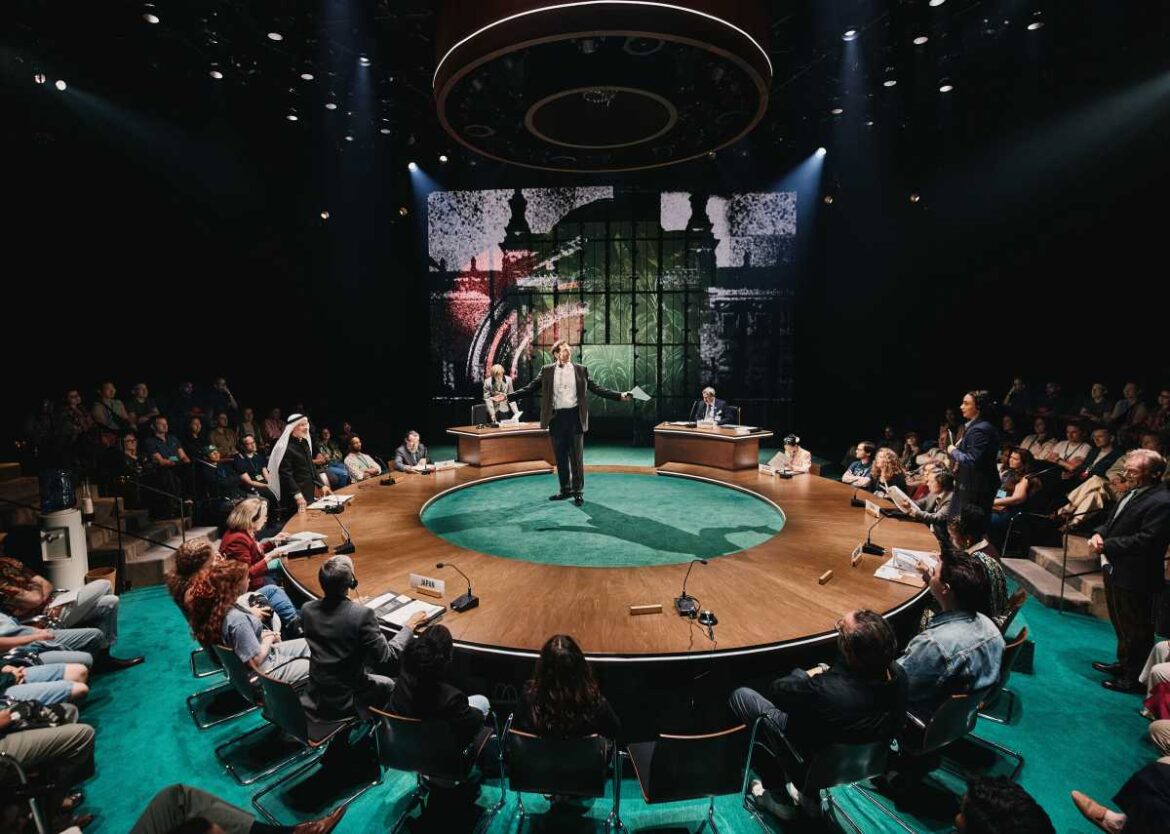Theater rarely tackles climate change, which makes “Kyoto” a welcome addition to the stage. The new political drama from Joe Murphy and Joe Robertson (“The Jungle”), now at Lincoln Center Theater’s Mitzi E. Newhouse, dramatizes the decade of negotiations that led to the 1997 Kyoto Protocol—the first major global agreement to curb greenhouse gas emissions.
Despite its grand scope and impressive pedigree, this Off-Broadway import from the Royal Shakespeare Company ultimately feels more didactic than dramatic. What should feel urgent and alive too often plays like a three-hour seminar.
Under the brisk, precision-tooled direction of Stephen Daldry and Justin Martin, “Kyoto” transforms the Newhouse into a massive conference table, surrounding the audience with the action. Delegates spar over baselines and brackets while powerful lobbyists quietly work the margins. As political theater, the craftsmanship impresses; as storytelling, the results are mixed.
At its center is Don Pearlman (Stephen Kunken), a Washington lawyer-turned-lobbyist who inserts himself into U.N. negotiations on behalf of oil interests. Kunken, reprising the role he originated in the U.K., delivers a magnetic performance—witty, calculating, and darkly charismatic. Channeling a Brooks Brothers Richard III, he guides the audience through the bureaucratic maze, revealing how language, procedure, and ego can derail even the noblest intentions.
The international ensemble brings vigor and variety, with Jorge Bosch’s steady Raúl Estrada-Oyuela anchoring the diplomacy and sharp turns from Kate Burton, Erin Darke, and Taiana Tully as delegates from the United States, Germany, and Kiribati. Natalie Gold lends quiet grace to Shirley Pearlman, Don’s wife and the play’s moral compass, whose growing disillusionment offers a human counterpoint to the political abstraction.
 The cast of “Kyoto.”Photo: Emilio Madrid
The cast of “Kyoto.”Photo: Emilio Madrid
Murphy and Robertson handle the intricacies of climate diplomacy with exhaustive precision, but the torrent of exposition—five major conferences from 1989 through 1997, countless delegations, and endless acronyms—soon overwhelms. The arguments blur together, and the characters, often reduced to national or ideological symbols, never fully emerge as individuals. What begins as a brisk political thriller gradually settles into procedural repetition.
Even the play’s most damning revelation—that the “Seven Sisters” oil companies knew about climate change as early as 1959—lands softly, diluted by a sentimental coda in which Shirley muses about cherry blossoms and fleeting global unity.
The play’s depiction of nations struggling to reach consensus now plays like a relic from a more cooperative era, especially as current U.S. leadership has grown increasingly brash in rejecting international efforts to curb emissions. The irony is sharpened by Bill Gates, who has recently tempered his once-dire warnings about climate catastrophe. In this context, “Kyoto” feels less like a historical drama than an elegy for a time when global cooperation and coordinated action on climate change still seemed possible.
Like “1776,” which depicts the creation of the Declaration of Independence, and “Oslo,” about the secret talks that produced the Oslo Accords, “Kyoto” explores how idealism and pragmatism collide in the making of history. But where those plays found character and suspense within compromise, “Kyoto” fixates on process—on rules, acronyms, and endless debate—until the human element is buried beneath the paperwork.
Mitzi E. Newhouse Theater, 150 W. 65th St., lct.org. Through Nov. 30.


AloJapan.com